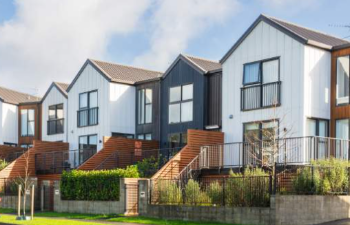As a global economic powerhouse, the United States boasts numerous economic, technological, and defense advantages.
Following the 2008 financial crisis, property prices in many US cities plummeted, attracting significant interest from global investors. Many investors flocked to the US. Is US real estate the most attractive investment option in Europe?
- In the US, even in major cities, and even in the San Francisco Bay Area, home to the world's most technologically advanced economies, residential real estate is only a hedge against inflation. The best investment is in stocks of great companies (ordinary people should avoid buying stocks of specific companies and instead invest in index funds).
- This is because US land is freehold, and homes are subject to annual property taxes. Buying a home in the US is about more than just a one-time transaction; it's more about your family's ongoing cash flow.
The US real estate market is driven by its numerous excellent investment cities and the country's overall policies. Against the backdrop of such a strong economy, many US cities have flourished, attracting numerous investors from around the world. This influx of investment capital has fueled a surge in capital flows in many US cities, igniting the real estate market. The number of real estate investors in the United States ranks among the highest in Europe.

Is American real estate the most attractive investment in Europe?
American real estate does have investment value, and it is the most valuable in many European countries. American real estate is also subject to certain property tax rates. As a highly developed capitalist country, the tax payment and value preservation methods for American real estate differ from those in China. However, American real estate offers greater appreciation potential and investment opportunities, allowing investors to achieve higher returns at a higher cost.
American Home Buying Model
- Deposit Stage
The US real estate market is highly market-oriented, and in principle, there are no specific regulations for pre-sales of real estate. However, as long as the risks of purchasing pre-sale properties are fully disclosed, some developers may sell pre-sale properties before they become available. All US real estate developers are required to submit a sales plan to the relevant authorities before selling properties. If pre-sales are adopted, the project plan must include disclosure of the risks and clearly outline the risks. This plan must also be provided to the buyer at the time of signing the purchase contract. Generally speaking, US developers collect a deposit of 10-20% of the total purchase price, which is held in an escrow account overseen by lawyers.
This deposit can only be used as a credit condition for financial institutions before the property is delivered to the buyer after satisfactory inspection. Developers cannot use any of the deposit for legitimate financing. Banks have every incentive to monitor the developer's construction progress to protect their interests, as failure to complete the project at this stage could deprive them of their loan.
- Acceptance Stage
Before the property is delivered to the homeowner, the relevant government acceptance department must inspect the property and issue an acceptance certificate. Homeowners can also seek independent inspections from relevant professional agencies. Only after the inspection and acceptance pass can the property be delivered. Only with the acceptance certificate can the real estate developer receive the payment from the third-party agency.
If the project is unfinished at this stage, the homeowner can file for arbitration to recover their deposit and purchase price from the third-party regulatory agency.
The developer must wait until the property is delivered to the buyer before receiving the final payment through a commercial bank mortgage loan, and the homeowner only needs to begin repaying the mortgage after taking possession of the property.

Germany
Installment Payment Based on Construction Progress
The pre-sale system for commercial housing is widely practiced in Germany and does not require government approval. The transaction is negotiated directly between the buyer and the developer, with a lawyer present throughout the entire process. The contract typically specifies installment payments based on construction progress. Buyers can request that the bank issue a completion guarantee for the developer, urging the bank to oversee the developer.
If the property is purchased off-plan, payment is based on the construction progress.
The process generally involves seven steps:
- The first installment is 30% of the purchase price, payable 6-8 weeks after notarization. The developer is entitled to receive the down payment only after the buyer's name is registered in the property register.
- The second installment is 28% of the purchase price, payable upon completion of the project's basic structural framework.
- The third installment is 12.6% of the purchase price, payable upon completion of the roof, drainage system, windows, and other installations.
- The fourth installment is 10.5% of the purchase price, payable upon completion of the heating system, bathroom systems, electrical installation, and interior wall painting.
- The fifth installment is 7% of the purchase price, payable upon completion of the flooring, bathroom tiling, and exterior decoration.
- The sixth installment is 8.4% of the purchase price, payable upon completion of move-in preparations.
- The seventh installment is 3.5% of the purchase price, payable upon completion of finishing touches.
To ensure the quality of the property, the contract typically stipulates that approximately 10% of the total purchase price will be held in safekeeping by an attorney for three to five years after completion. This will be paid to the developer upon verification that there are no disputes, along with interest on the deposit.
If the developer fails to deliver the property by the specified date, the buyer can request a payment deferral, a discount, a refund, or even compensation, as per the contract. German insurance companies also offer insurance products specifically designed to protect against the risk of unfinished pre-sale properties, which are available to both developers and homebuyers.
If neither company purchases insurance and the developer goes bankrupt or liquidates, the unfinished portion can be cashed out as part of the developer's liquidation, but the homebuyer will have to pay someone else to continue construction to avoid unfinished projects.
